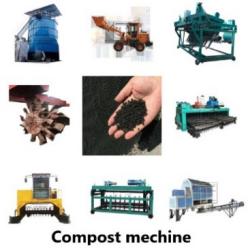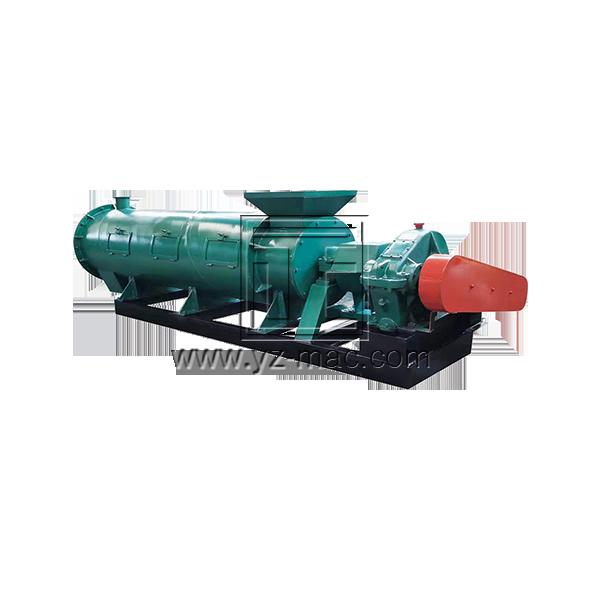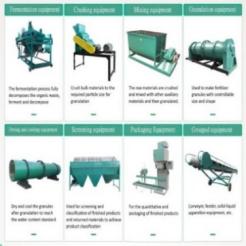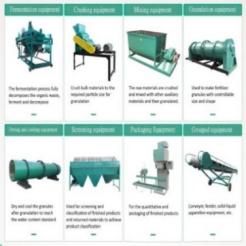Organic fertilizer machine
An organic fertilizer machine, also known as a composting machine or organic fertilizer production equipment, is a specialized device designed to convert organic waste into nutrient-rich fertilizer. By utilizing natural processes, these machines transform organic materials into organic fertilizers that enhance soil health, improve plant growth, and promote sustainable agriculture.
Benefits of Organic Fertilizer Machines:
Environmentally Friendly: Organic fertilizer machines contribute to sustainable agriculture by reducing the reliance on chemical fertilizers. They enable the conversion of organic waste materials into valuable fertilizers, minimizing waste generation and reducing environmental pollution associated with the disposal of organic waste.
Nutrient-Rich Fertilizers: Organic fertilizer machines break down organic waste through processes such as composting, fermentation, or vermicomposting. These processes transform the organic materials into nutrient-rich fertilizers that contain essential elements for plant growth, including nitrogen (N), phosphorus (P), and potassium (K), as well as beneficial microorganisms.
Improved Soil Health: Organic fertilizers produced by these machines enrich the soil with organic matter, enhancing soil structure, water-holding capacity, and nutrient retention. They promote the growth of beneficial microorganisms, improve soil biodiversity, and stimulate soil fertility, leading to healthier plants and sustainable soil management.
Cost-Effective Solution: Organic fertilizer machines offer a cost-effective solution for farmers and gardeners. By converting organic waste into organic fertilizers on-site, they reduce the need for purchasing expensive chemical fertilizers. Additionally, the use of organic fertilizers can improve crop yield and quality over the long term, reducing input costs and maximizing returns on investment.
Types of Organic Fertilizer Machines:
Compost Turners: Compost turners are machines designed to facilitate the composting process by mechanically turning and mixing the organic waste materials. They ensure proper aeration, temperature control, and moisture distribution, accelerating the decomposition of organic materials and producing high-quality compost.
Fermenters: Fermenters, or fermentation tanks, are used for anaerobic fermentation of organic waste. These machines create an oxygen-free environment where beneficial microorganisms break down the organic materials, converting them into nutrient-rich organic fertilizers.
Vermicomposters: Vermicomposters utilize worms (typically red worms) to decompose organic waste and produce vermicompost, a nutrient-rich organic fertilizer. These machines provide a controlled environment for the worms to thrive, facilitating the breakdown of organic materials and the conversion into high-quality vermicompost.
Applications of Organic Fertilizer Machines:
Organic Farming: Organic fertilizer machines are extensively used in organic farming practices. They enable farmers to convert farm waste, crop residues, and other organic materials into organic fertilizers, ensuring the use of natural and sustainable inputs for crop production.
Gardening and Horticulture: Gardeners and horticulturists utilize organic fertilizer machines to process kitchen scraps, yard trimmings, and other organic waste into organic fertilizers suitable for nurturing plants in home gardens, community gardens, and ornamental landscapes.
Agricultural Waste Management: Organic fertilizer machines play a crucial role in the proper management of agricultural waste, such as livestock manure, crop residues, and agricultural byproducts. By converting these materials into organic fertilizers, they reduce waste accumulation, prevent environmental pollution, and create valuable resources for crop production.
Environmental Restoration: Organic fertilizer machines are utilized in environmental restoration projects, such as land reclamation and soil remediation. They process organic materials and biomass to produce organic fertilizers that are applied to degraded soils, helping restore soil fertility, promote vegetation growth, and contribute to land rehabilitation efforts.
Organic fertilizer machines offer a sustainable solution for converting organic waste into nutrient-rich fertilizers. These machines contribute to environmentally friendly practices, improve soil health, and reduce reliance on chemical fertilizers. With various types of machines available, such as compost turners, fermenters, and vermicomposters, organic fertilizer production can be customized to suit different needs and applications in organic farming, gardening, waste management, and environmental restoration.







